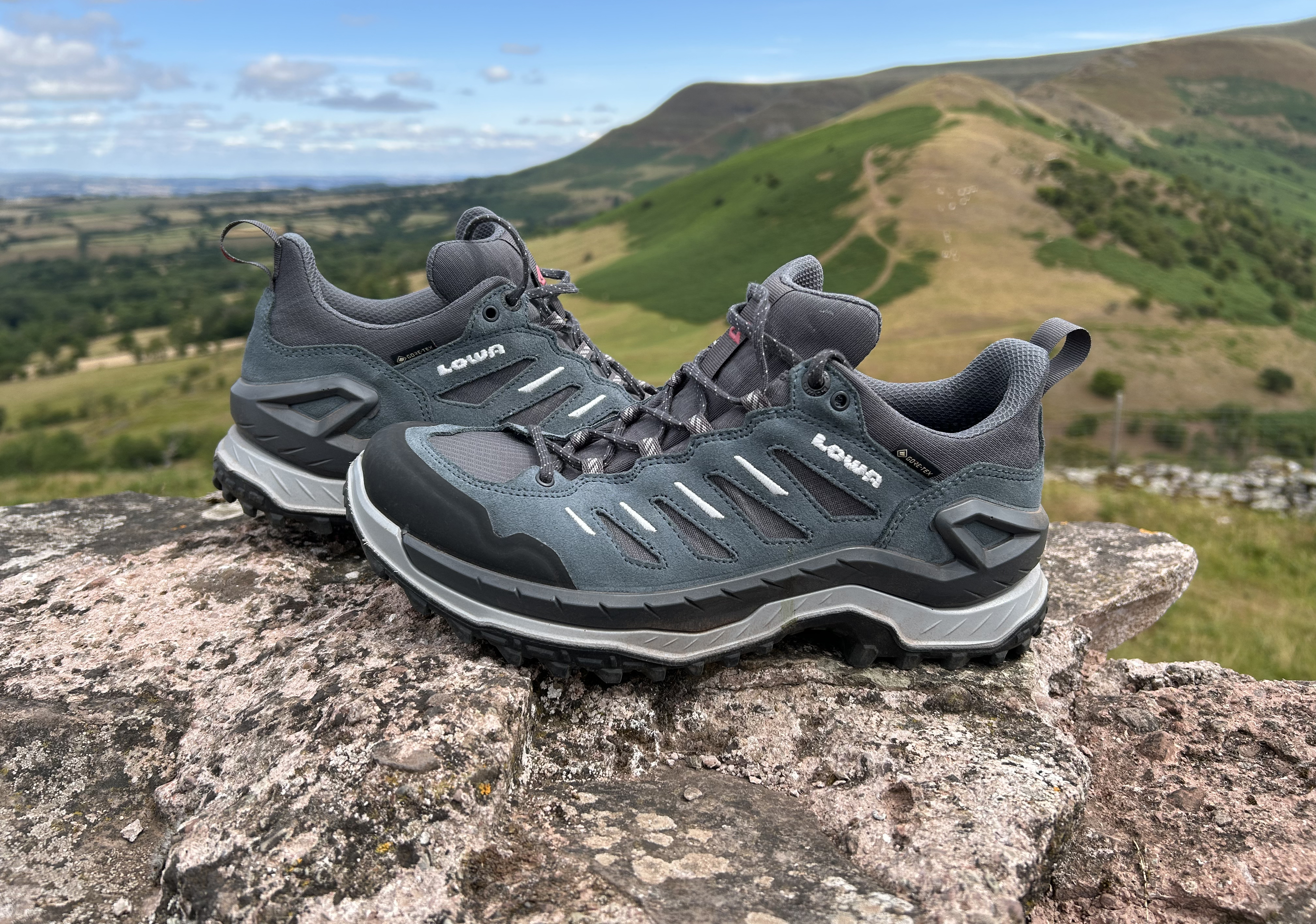Advnture Verdict
As standard hiking shoes go, there are few better than the Innovo GTX Lo. Its quality components and expert design make it a comfortable, capable and highly protective option for medium-paced hiking days on technical trails. It’s relatively heavy so isn’t suited to speed, making it less versatile than some of the competition, while its low cut isn’t great for boggy ground. However, for hikers looking for a reliable and durable option for the mountains, it’s a very strong choice.
Pros
- +
Very protective
- +
Supportive and comfortable
- +
Classic aesthetic
- +
Outsole capable on mud and rock
- +
Gore-Tex waterproofing
Cons
- -
Heavier than many hiking shoes
- -
A bit of an investment
- -
Not ideal for the everyday
You can trust Advnture
Lowa celebrated its 100th birthday in 2023, marking a century of crafting quality footwear. During that time, the Bavarian brand has forged a solid reputation among hikers and mountaineers for its capable shoes and boots, the creation of which remains its core competency.
The brand’s fleet of hiking footwear is world-renowned. Its best-selling Renegade shoes and boots, launched in 1997, are a familiar sight on the trails. Our very own Julia Clarke wore the Renegade Evo GTX Mid on her adventure to Everest Base Camp and returned with suitably glowing reports.
The Renegade’s younger cousins are the members of the Innovo family, which boast chunky, grippy outsoles, suede uppers and a supportive and protective design. Iterations of the Innovo are available with or without Gore-Tex and as a hiking boot or lower cut shoe.
I was delighted to test out the low-cut Gore-Tex version in the hills of South Wales’ Bannau Brychieniog and on the trails of Southwest England. Unfortunately we can’t all go to Everest every time we test a pair of hiking shoes.
First impressions
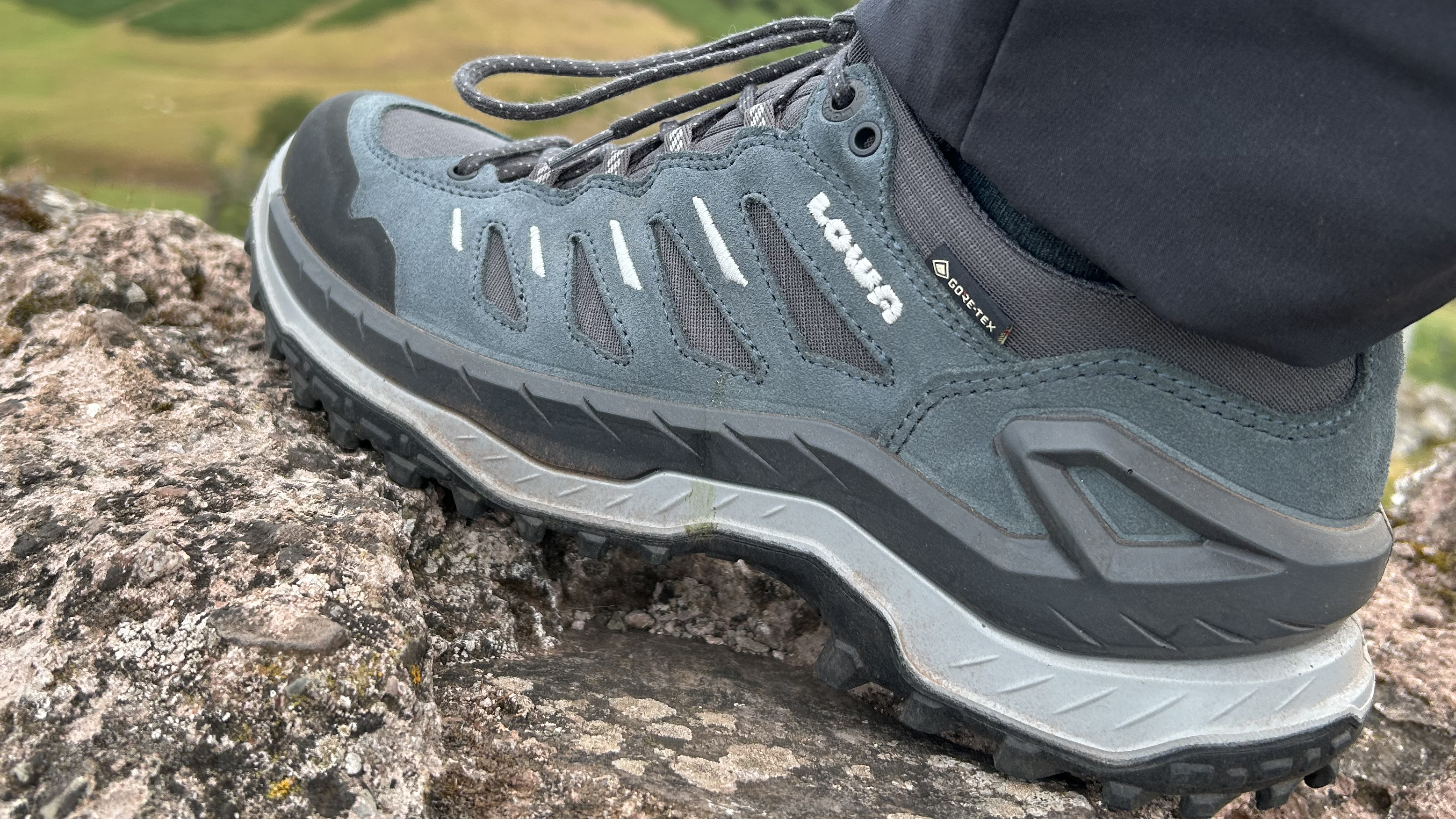
List price: $225 (US) / £170 (UK)
Models available: Men’s and women’s
Weight (per shoe): 1lb 1oz / 490g
Materials: Suede and synthetic upper; Gore-Tex ePE lining; PU-foam double injection midsole; PU support frame; Lowa Terra Trac rubber outsole
Colors: Men’s: Grey/Flame, Olive/Amber Green, Dark Petrol/Moor (UK only); Women’s: Navy/Arctic, Seaweed/Mint, Smoke Blue/White (UK only)
Compatibility: Hiking, scrambling, via ferrata
The Innovo looks every inch the classic hiking shoe. With its suede upper, speckled laces, protective rand at the toes and breathable gills on the outer side of the foot, it suggests capability from the off. Its hefty appearance hints at comfort and support – of a shoe that’s at home on technical terrain in the mountains. It doesn’t look or feel like a shoe you’d want to run in necessarily, nor does it have the sneaker-like aesthetic of lightweight hikers and its wide curves are at odds with the more streamlined profile of an approach shoe. No, this is no Jack-of-all-trades; this is a hiking shoe.
I slipped my foot in and immediately liked what I felt. It’s nicely cushioned, reassuringly rigid but also flexible enough to maintain its initial comfort when on the move. In terms of fit, it holds the midfoot firmly and the heel sits nicely in its rear throne. Wiggle room for the toes isn’t as pronounced as something like Keen’s NXIS Evo Mid but there’s still more than enough for my feet to feel happy for mile after mile.
Weighing 1lb 1oz (490g) per shoe, it’s at the heavier end of the hiking shoe spectrum and I soon appreciated that the Innovo has more in common with a hiking boot than a trail running shoe. The sole is chunky, grippy and rigid. Not as rigid as a pair of winter hiking boots, but less yielding than many 'fast and light' options.
All the latest inspiration, tips and guides to help you plan your next Advnture!
Quality design
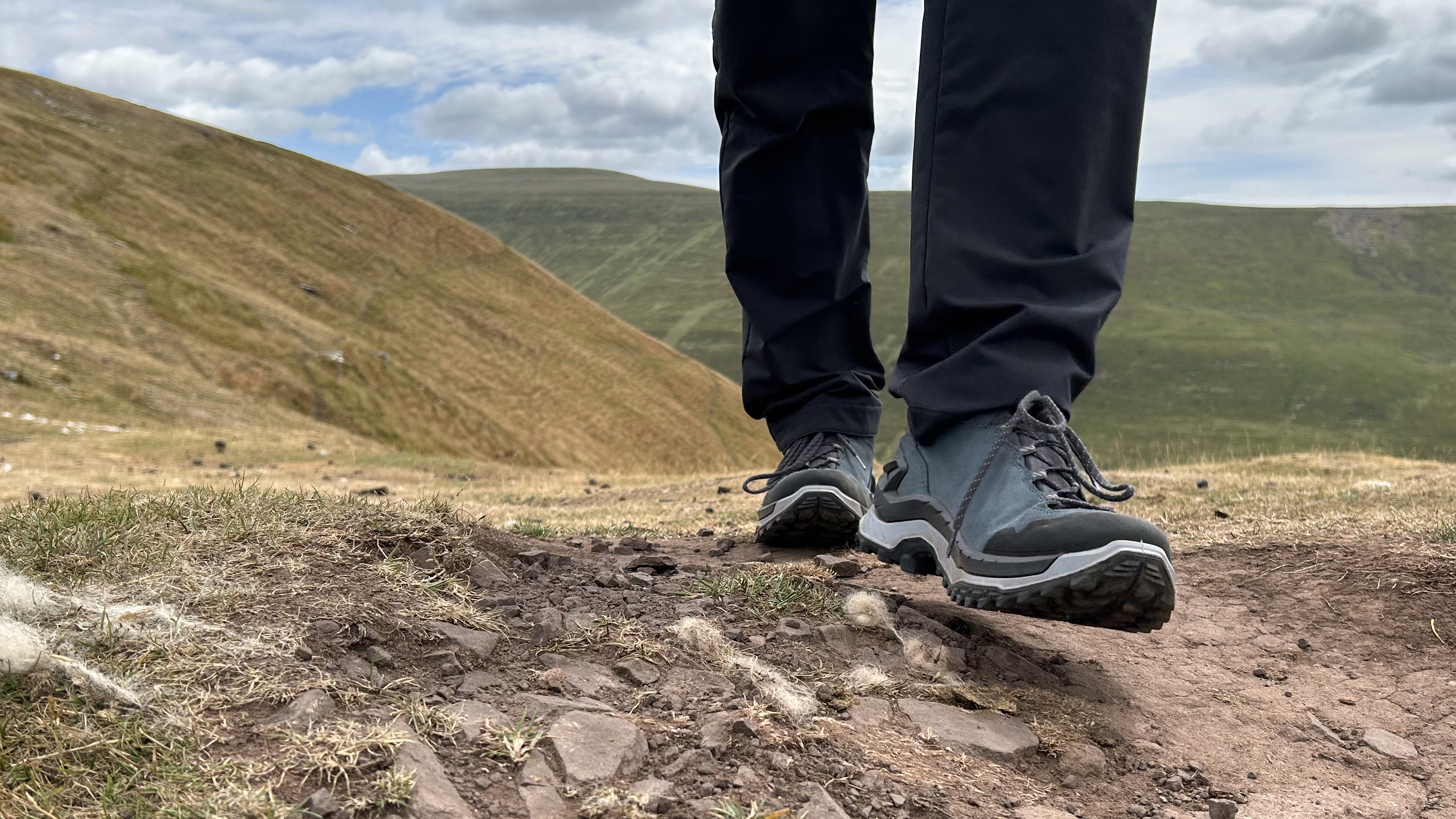
The Innovo’s upper is made from a blend of suede and synthetic fabrics. Suede is a more pliable, softer leather than the high grain nubuck seen in Lowa’s Renegade shoes. This has the advantage of comfort, though it tends to be less durable than nubuck. However, we’re still talking about quality leather here and Lowa’s shoes are renowned for being hard-wearing, so I have few concerns on this front.
Working its magic beneath the suede is the Gore-Tex lining, providing breathability while keeping water out. The inner side of the upper is pure suede, providing protection against abrasion. Meanwhile, the outer side contains an array of four breathable mesh panels that put me in mind of Merrell’s classic Moab series.
The fairly standard lacing system makes use of webbed eyelets to keep both pressure on the foot and weight to a minimum, as well as a pair of punched eyelets towards the toes. Both tongue and collar are nicely padded, while there’s a fabric loop for easy hanging or for attachment to a carabiner.
A chunky, proprietary sole
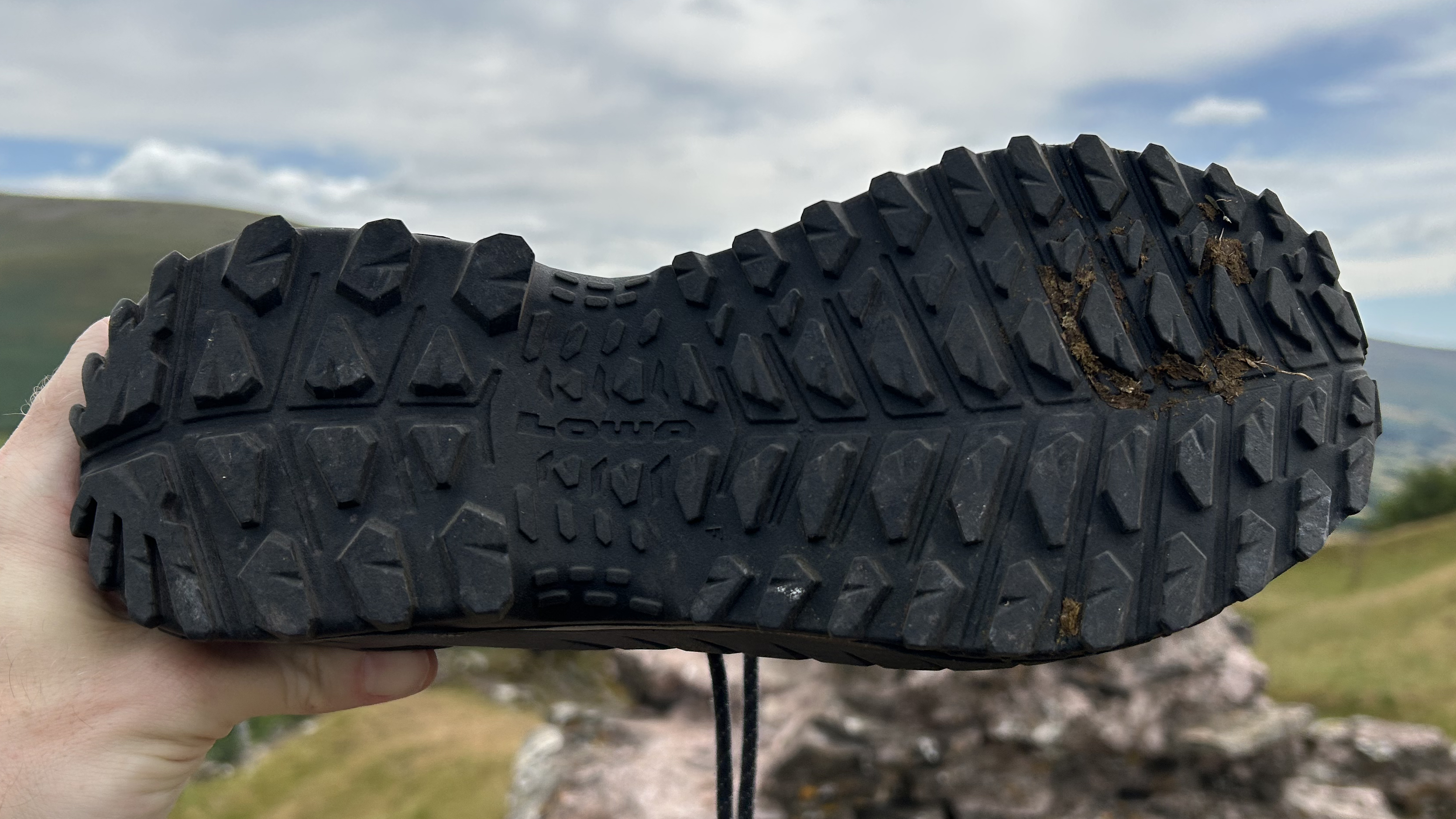
The Lo version of the Innovo features the same aggressive sole as its bigger boot brother, as well as boasting Lowa’s proprietary rubber compound rather than the Vibram often seen in premium hiking footwear. As mentioned, it’s more rigid than most – an important quality when taking on technical terrain. However, there’s still flex towards the toes, which works with the foot’s natural rolling properties when striding along.
The sole features 67 deep lugs of differing shapes and sizes, with most being medium-sized, flat-topped and not particularly directional. This all points to a design intended to hold soft terrain rather than fly along at speed, while the flat surface of the lugs suggests decent grip on rock. Unlike an approach shoe, there’s no flatter region at the toes for precision when edging or smearing, though the two lugs beneath the heel are larger than the rest, design for effective braking in descent.
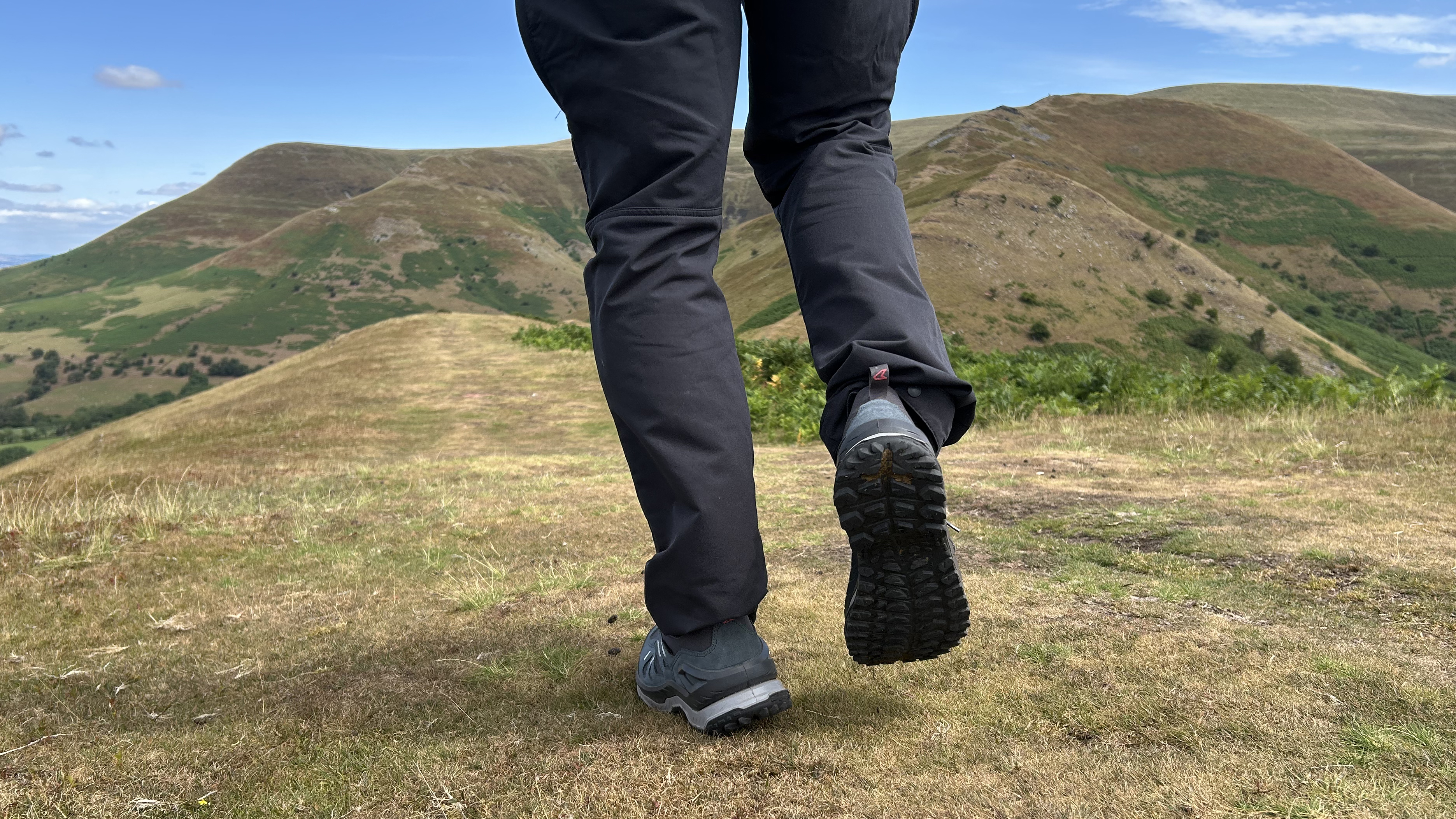
The midsole is forged from a dynamic polyurethane that maintains its shape even after being compressed “thousands of times”, according to Lowa. This should enable years of happy exploring, though unlike the Lowa Cevedale Pro GTX Mid, the Innovo doesn’t boast a resoleable design, which is a shame.
Hidden within the shoe is Lowa’s polyurethane Monowrap support frame. This is what I have to thank for the way the shoe embraces and holds the foot, providing the support and stability to take on rough terrain without issue. More on this in a mo…
In the field
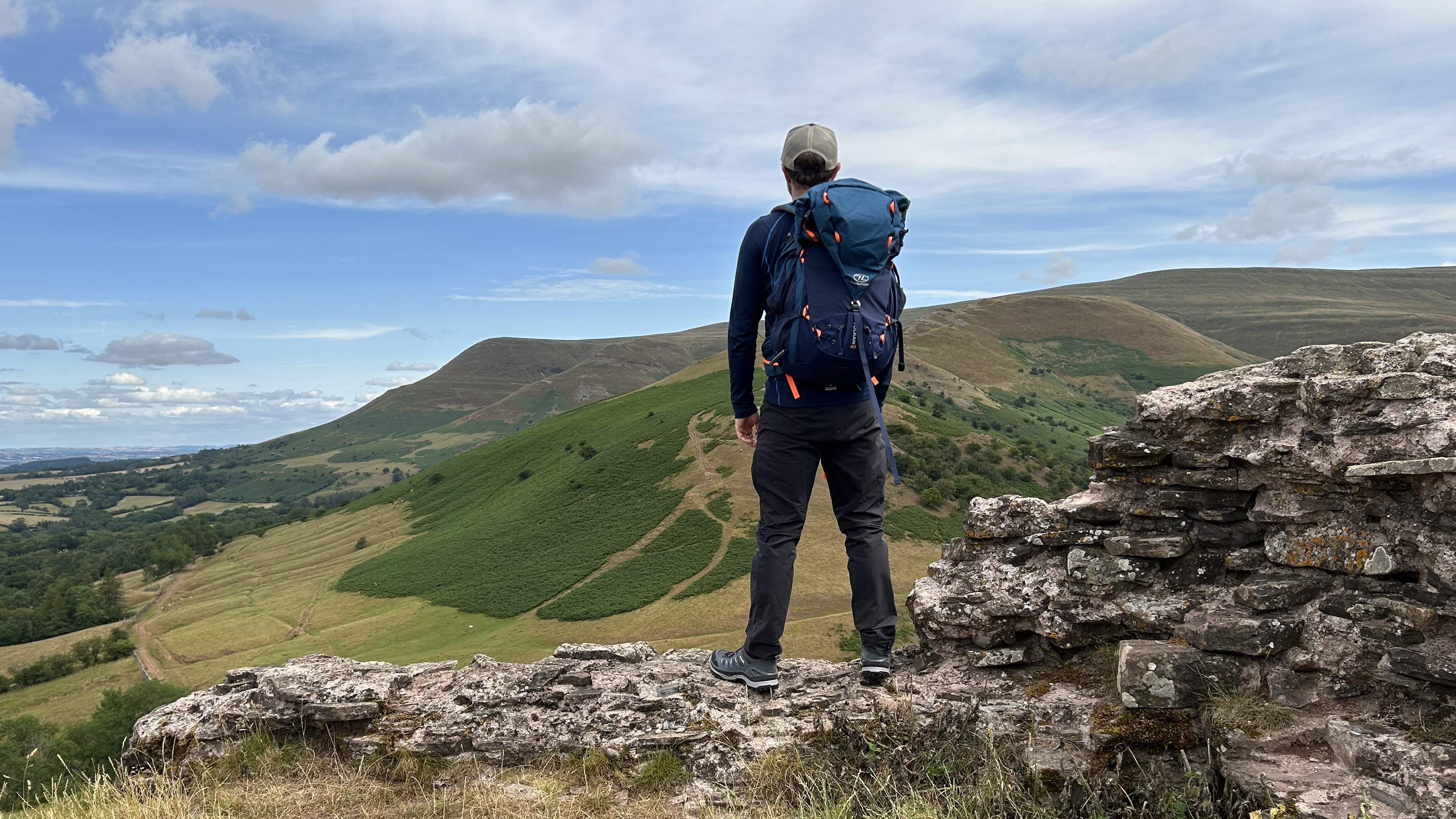
I’ve been testing the Innovos through late winter, spring and summer on hiking trips to the Bannau Brycheiniog (Brecon Beacons) National Park and on walks in the Pembrokeshire Coast National Park and Southwest England.
The way the Innovo cradles the foot is a real strength. I can think of few other pieces of hiking footwear I’ve worn that have given such an impression of support and protection alongside comfort and flexibility. The cushioning provided by the PU midsole provides a nice amount of propulsion, while the frame really does hold the foot in place beautifully. This all adds to make the Innovo a superb option for long days on the trail or multi-day trekking adventures, especially in drier climes such as those in the Alps.
Its low cut means that boggy terrain is its enemy, as water can get in over the top unless it’s carefully paired with gaiters. This was a bit of an issue when crossing a soggy bwlch (the Welsh word for a depression between two peaks), a common occurrence when hiking in the Bannau Brycheiniog. However, the Innovos kept my feet nicely dry most of the time. Nevertheless, I’d probably opt for the boot version if I was looking to take on some of Britain’s wetter long-distance trails.
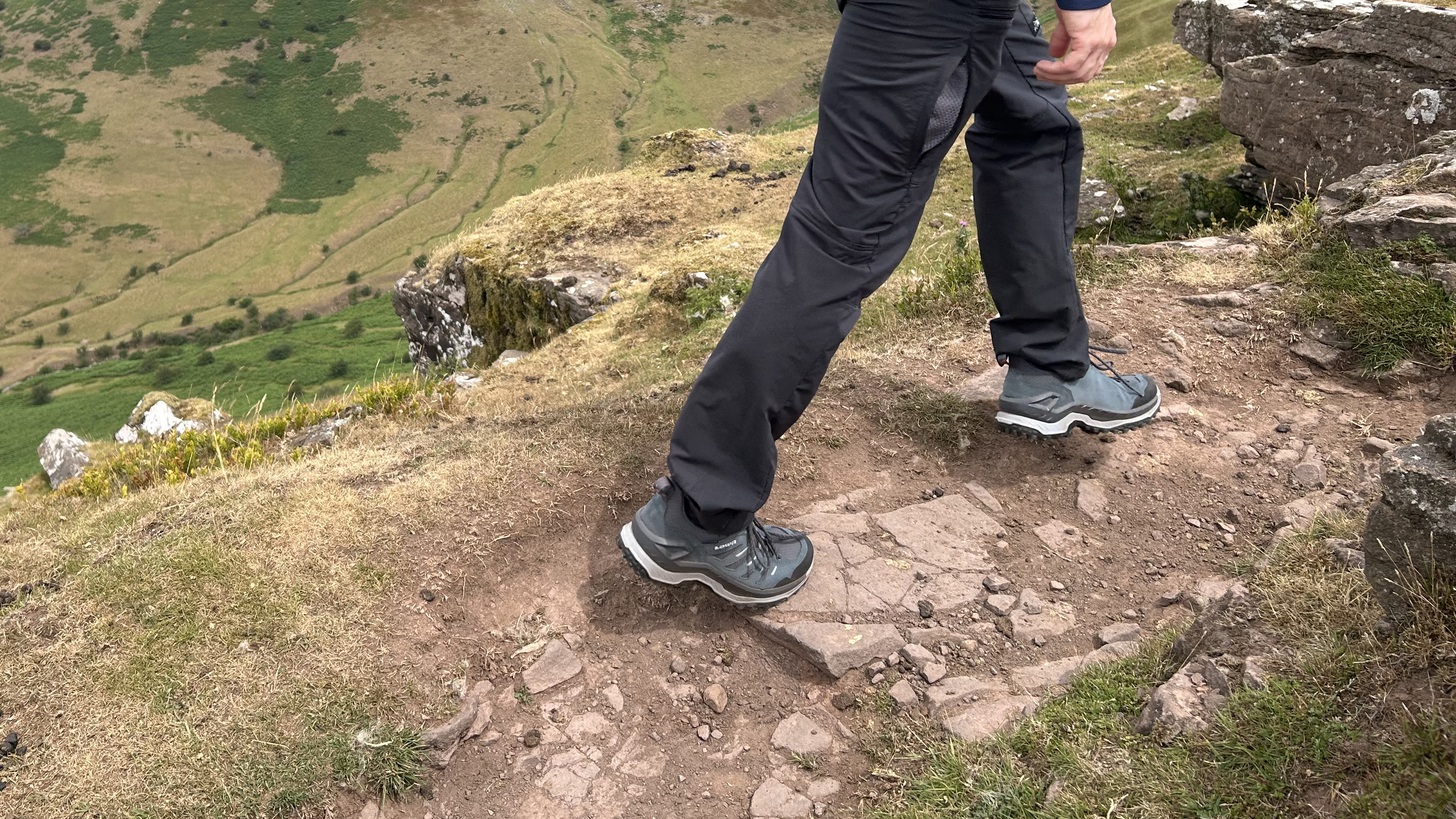
I was very impressed with the grippiness of the outsole, which provided ample hold on both wet and dry terrain, rock and the sloppier stuff. The array of deep lugs hold admirably on soft ground, the heel brake provides confidence when descending earthen slopes. Meanwhile, the amount of sticky rubber in contact with rock when negotiating scrambling terrain also provides solid traction. I’d have no qualms wearing these on more technical multi-day hikes, such as the Dolomites’ Alta Vias or Corsica’s GR20. They’re not as tailored to the kind of ground where scrambling becomes climbing as dedicated approach shoes, but for the kind of scrambling terrain found on hikes, they’re great.
Their design and weight mean that the Innovo is much more at home on the trails than the streets, so they’re not the kind of hiking shoes you might wear for the everyday. There’s no doubt that they’re less versatile than many lighter shoes, such as the Aku Omnia V-light GTX. At $225 (£170 in the UK), they’re not the cheapest hikers on the market either. So, bear all of this in mind should you decide to make a purchase.
Nevertheless, they’re a sound investment if you’re an avid hiker in the market for a capable shoe for technical hiking missions.
Also consider
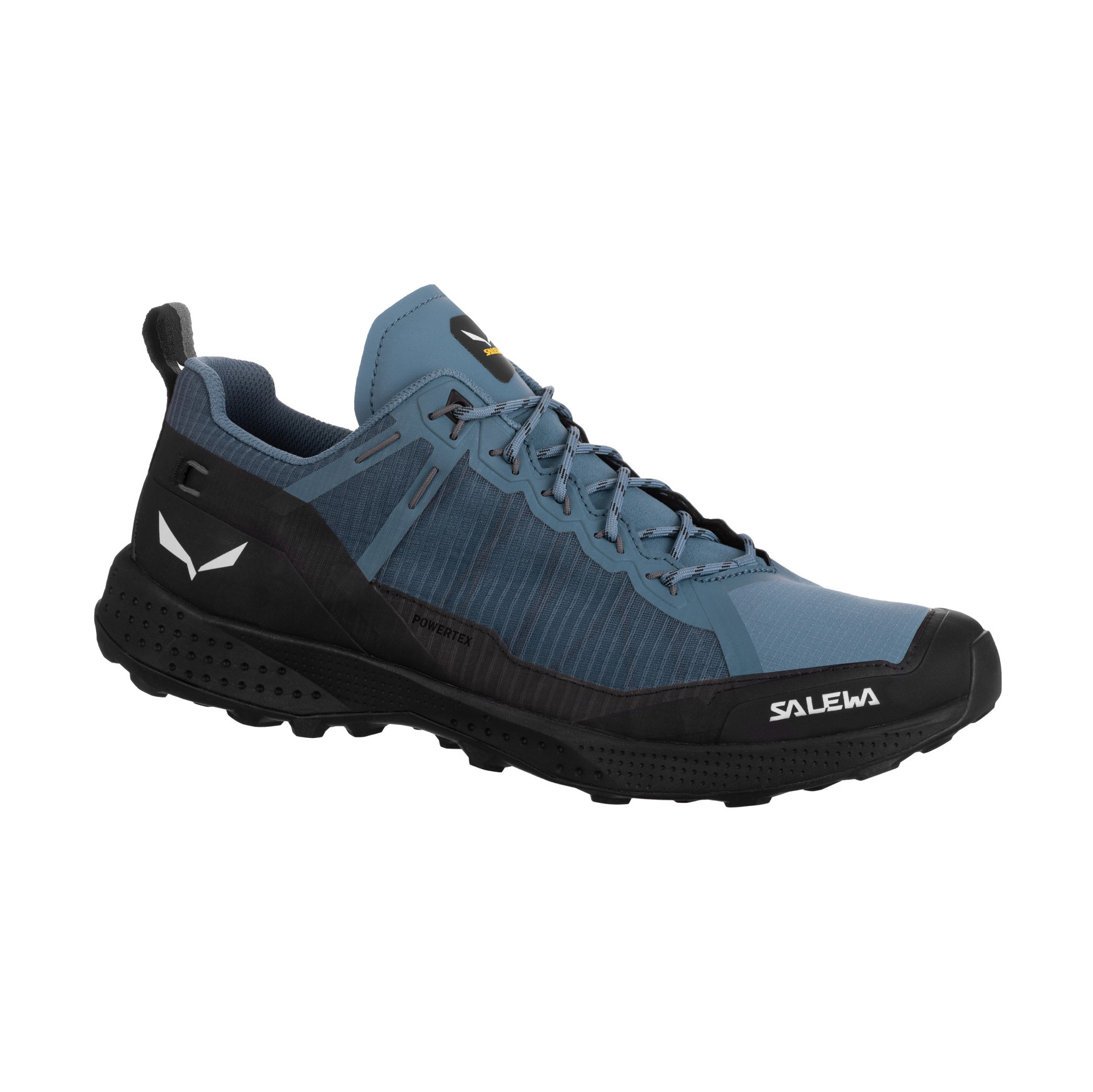
The Pedeoc is a smart, modern and versatile hiking shoe that's got the technical clout to deal with backcountry escapades but still looks good in the pub. It's both comfortable and lightweight, making it a great shout for speedy missions, and it features Salewa's Powertex waterproof membrane too.
Pros
- Smart, modern looks
- Very comfortable
- Reasonably light for a hiking shoe
- Product monitored for environmental impact
- Decent protection against abrasion
Cons
- Quite pricey for a hiking shoe
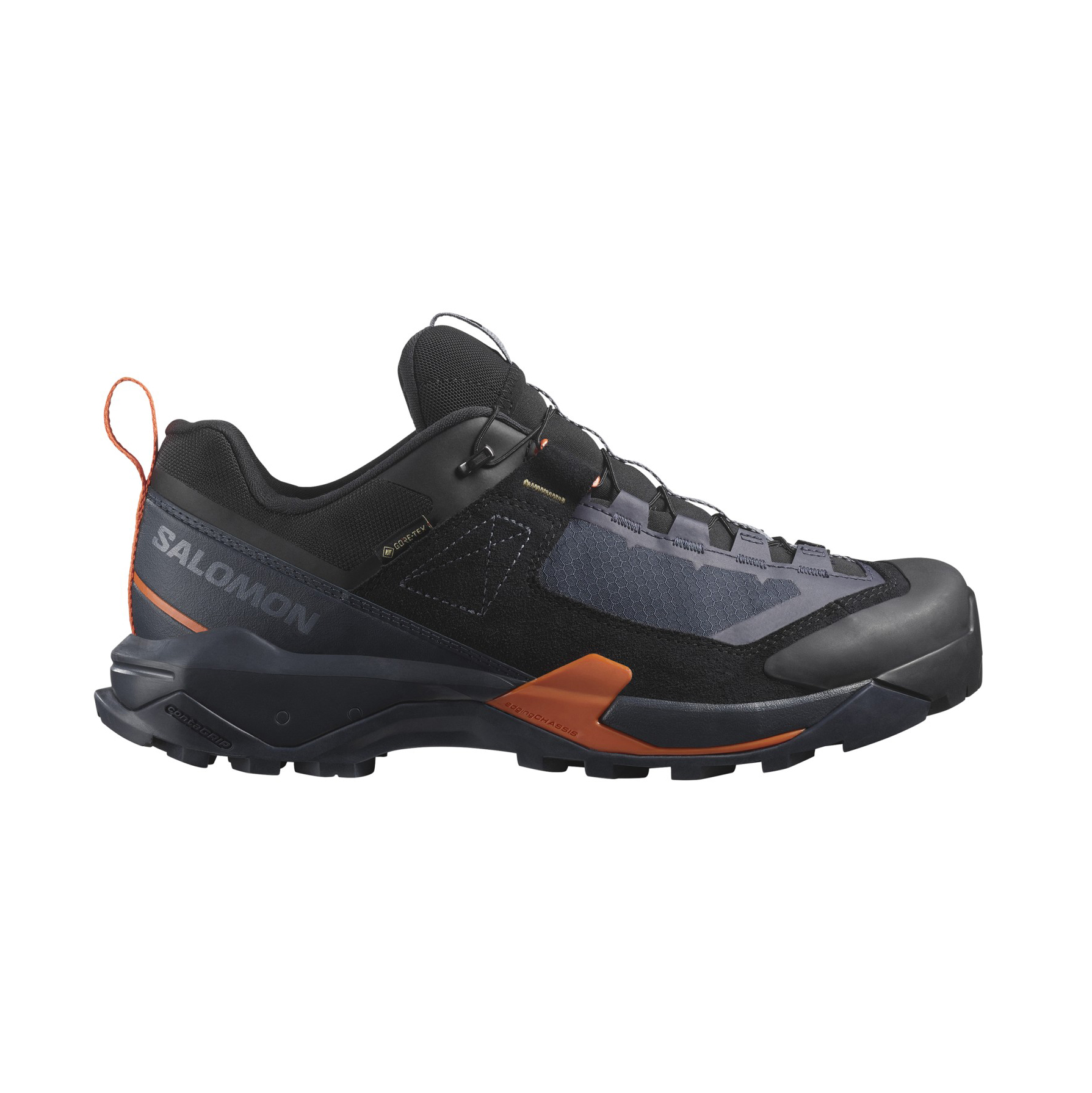
A protective and burly hiking shoe, this is one for more serious, technical adventures. Borrowing features from approach shoes, it provides stability on tough mountain trails and provides a good shield against rock abrasion and other scrapes. Featuring a Gore-Tex waterproof membrane, they'll keep your feet dry too.
Read our full Salomon X Ultra Alpine Gore-Tex hiking shoe review
Pros
- Great for scrambling
- Really smart looking
- Gore-Tex waterproofing
- Highly protective
- Superb grip on a variety of surfaces
Cons
- Heavier than many hiking shoes
- Low cut not great on wet terrain
Comparison table
Hiking shoe | List price | Weight | Best use |
|---|---|---|---|
Lowa Innovo GTX Lo | $225 (US) / £170 (UK) | 1lb 1oz / 490g | Hiking |
Salewa Pedroc Powertex | $179.95 (US) / £175.00 (UK) | 12oz / 345g | Fast hiking |
Salomon X Ultra Alpine Gore-Tex | $200 (US) / £180 (UK) | 15oz / 420g | Technical hiking / scrambling |
Alex is a freelance adventure writer and mountain leader with an insatiable passion for the mountains. A Cumbrian born and bred, his native English Lake District has a special place in his heart, though he is at least equally happy in North Wales, the Scottish Highlands or the European Alps. Through his hiking, mountaineering, climbing and trail running adventures, Alex aims to inspire others to get outdoors. He's the former President of the London Mountaineering Club, is training to become a winter mountain leader, looking to finally finish bagging all the Wainwright fells of the Lake District and is always keen to head to the 4,000-meter peaks of the Alps. www.alexfoxfield.com
